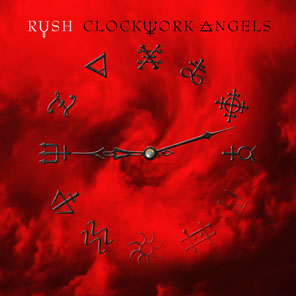In the Fullness of Time: A Look Back at Clockwork Angels on its 5th Anniversary
 It all began over 7 ½ years ago, in the late fall of 2009. Neil Peart had just published an update to the ‘News, Weather, and Sports’ section of his website. In the November 2009 entry titled Autumn Serenade, the Rush drummer and lyricist first revealed that he and his fellow bandmates would be getting together to discuss the future of the band or, as he put it, “…another kind of 'reinvention'.” Beyond the exciting news of Rush returning to the studio came the stark realization that the band’s ‘reinvention’ may actually lead to something entirely different. It was this statement from Peart that gave everyone pause:
It all began over 7 ½ years ago, in the late fall of 2009. Neil Peart had just published an update to the ‘News, Weather, and Sports’ section of his website. In the November 2009 entry titled Autumn Serenade, the Rush drummer and lyricist first revealed that he and his fellow bandmates would be getting together to discuss the future of the band or, as he put it, “…another kind of 'reinvention'.” Beyond the exciting news of Rush returning to the studio came the stark realization that the band’s ‘reinvention’ may actually lead to something entirely different. It was this statement from Peart that gave everyone pause:“The importance of 'the album' is not what it was, and there is currently a reversion to a musical climate rather like the 1950s, when only 'the song' matters. Radio, downloads, and 'shuffle' settings are inimical to collected works. Because of that reality, record company advances that used to pay for album projects are a thing of the past, so if that was what we wanted to do, we'd be on our own.”Speculation and debate began to spread throughout the Rush fan community. Would Rush record a new album, or would they only record a song or two? Would they tour? Could they justify a tour if it wasn’t in support of a new album? Would they, instead, record a Feedback II album instead of creating new, original material?
The questions continued until Peart seemingly confirmed the band’s direction in a January 2010 interview with the Canadian Press. In the interview, Peart had this to say:
"We're thinking of writing and recording a few songs and maybe releasing them, and playing them live, and then going back and doing some more later. We just feel really free (in terms) of what we might do right now. Anything is possible in the nicest way and we like the fact of shaking it all up."Over the next couple of months, numerous interviews with all three band members solidified the fact that they were, indeed, working on a new album. Additionally they were also looking to go out on tour during the Summer where ‘some’ of the songs might be highlighted. It seemed that with every passing day, there was more news about the tour, and the songs Rush were working on. Then, within the span of the final week in May, official news broke that Rush would be releasing two new singles from their ‘upcoming (and untitled) album’ – ‘Caravan’ and ‘BU2B’ on June 1st. Then, days later, the album had an official title: Clockwork Angels.
Everything began to fall in place. The first two singles were released, the band went out on their ‘Time Machine 2010’ tour where they showcased the two new songs, and the tour continued well into 2011. Throughout that period of time, Rush continued to write, record, and evolve Clockwork Angels into something that, figuratively and perhaps literally, made the Rush community drool with anticipation – a bona fide concept album. Throughout their progressive history, Rush have always been known as the band whom recorded lengthy conceptual pieces. However they had never recorded a true concept album with the possible, arguable, exception of 1984’s Grace Under Pressure. With Clockwork Angels, it was revealed that Neil Peart had developed a fanciful, steampunk-inspired story which would be woven throughout each of the album’s songs. His thematic idea of “a future as seen from the past…with alchemy, clockwork, and steampunkery…” would connect all of the songs together, while still allowing them to stand individually. With their Snakes & Arrows Rush-fan producer Nick Raskulinecz back at the helm, Rush fans salivated at the notion of the band’s 20th album harkening back to their progressive-ladened roots.
Clockwork Angels did not disappoint.
In true clockwork fashion, the album featured twelve songs; presumably each aligning with the twelve hours on the face of a clock, as revealed on the album’s cover art. As an homage to their 2112 album, the clock read 9:12 which, assuming the time was of the PM variety, translates to 21:12 in military time. A more important tie-back to the 2112 album came in the form of introductions to each song, which appeared in the liner notes. These introductions, similar to those that appeared ahead of each section of 2112, provided context for each song in the grander scheme of the entire Clockwork Angels story. A story of a young man on a quest to find himself in a steampunk, sci-fi world teeming with anarchists and angels, pirates and carnival dwellers, explorers and Watchmakers. A story where a man, who always felt so small in his world, never stopped thinking big…
-- Read the rest of the review of Clockwork Angels at this LINK --

Comments
Post a Comment